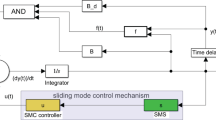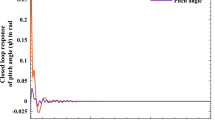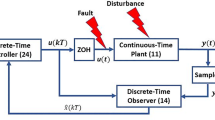Abstract
The indefinite linear quadratic (ILQ) optimal control problem for continuous-time descriptor Markov jump systems (DMJSs) is discussed in this work. Firstly, by using elementary linear algebra approach, the ILQ problem of DMJSs can be equivalent to standard LQ problem of Markov jump systems (MJSs) with some inequality and rank conditions. Then sufficient condition of the ILQ problem for DMJSs being solvable is obtained according to the LQ theory of MJSs, the optimal state feedback control is given, and the optimal cost value can be guaranteed to be nonnegative, moreover, the obtained optimal closed-loop system is stochastically admissible. Lastly, a numerical example is provided to verify the validity of the presented methods.
Similar content being viewed by others
References
R. Kalman, “Contribution to the theory of optimal control,” Boletin de la Sociedad Matematica Mexican, vol. 5, no. 2, pp. 102–119, 1989.
S. Mulgund and R. Stengel, “Optimal nonlinear estimation for aircraft flight control in wind shear,” Automatica, vol. 32, no. 1, pp. 3–13, 1996.
C. Diakaki, M. Papageorgiou, and K. Aboudolas, “A multivariable regulator approach to traffic-responsive network-wide signal control,” Control Engineering Practice, vol. 10, no. 2, pp. 183–195, 2002.
M. A. Rami, J. B. Moore, and X. Zhou, “Indefinite stochastic linear quadratic control and generalized differential riccati equation,” SIAM Journal on Control and Optimization, vol. 40, no. 4, pp. 1296–1311, 2002.
V. Marijan, P. S. Angela, and E. B. Mireille, “The regular indefinite linear quadratic optimal control problem: Stabilizable case,” SIAM Journal on Control and Optimization, vol. 56, no. 1, pp. 496–516, 2018.
J. Xu and H. Zhang, “Output feedback control for irregular LQ problem,” IEEE Control Systems Letters, vol. 5, no. 3, pp. 875–880, 2021.
L. Dai, Singular Control Systems, Springer, New York, 1989.
S. Xu and J. Lam, Robust Control and Filtering of Singular Systems, Springer, Berlin, 2006.
G. Duan, Analysis and Design of Descriptor Linear Systems, Springer, New York, 2010.
B. Sahereh, J. Aliakbar, and K. S. Ali, “H∞ filtering for descriptor systems with strict LMI conditions,” Automatica, vol. 80, pp. 88–94, 2017.
J. Chen, C. Lin, B. Chen, and Z. Zhang, “Observer-based adaptive neural control for a class of nonlinear singular systems,” International Journal of Robust and Nonlinear Control, vol. 30, no. 10, pp. 4043–4058, 2020.
Z. Cheng, H. Hong, and J. Zhang, “The optimal regulation of generalized state-space systems with quadratic cost,” Automatica, vol. 24, no. 5, pp. 707–710, 1988.
J. Zhu, S. Ma, and Z. Cheng, “Singular LQ problem for nonregular descriptor systems,” IEEE Transactions on Automatic Control, vol. 47, no. 7, pp. 1128–1133, 2002.
J. Feng, Z. Cheng, and S. Ma, “Singular linear-quadratic optimal control problem for a class of discrete singular systems with multiple time-delays,” International Journal of Systems Science, vol. 34, no. 4, pp. 293–301, 2003.
G. Zhang and L. Liu, “Linear quadratic optimal control based on dynamic compensation for rectangular descriptor systems,” ACTA Automatica Sinica, vol. 36, no. 12, pp. 1752–1757, 2010.
S. Ma and Z. Cheng, “Indefinite LQ problem for singular systems,” ACTA Automatica Sinica, vol. 32, no. 2, pp. 272–278, 2006.
P. Cui and C. Zhang, “Indefinite linear quadratic optimal control problem for singular linear discrete-time system: Krein space method,” ACTA Automatica Sinica, vol. 33, no. 6, pp. 635–639, 2007.
Q. Zhang and S. Xing, “Stability analysis and optimal control of stochastic singular systems,” Optimization Letters, vol. 8, no. 6, pp. 1905–1920, 2014.
W. Zhang, Y. Lin, and L. Xue, “Linear quadratic Pareto optimal control problem of stochastic singular systems,” Journal of the Franklin Institute, vol. 354, no. 2, pp. 1220–1238, 2017.
Y. Lin, T. Zhang, and W. Zhang, “Infinite horizon linear quadratic Pareto game of the stochastic singular systems,” Journal of the Franklin Institute, vol. 355, no. 10, pp. 4436–4452, 2018.
O. L. V. Costa, M. D. Fragoso, and M. G. Todorov, Continuous-time Markov Jump Linear Systems, Springer, London, 2013.
L. Zhang and E. K. Boukas, “Stability and stabilization of Markovian jump linear systems with partly unknown transition probabilities,” Automatica, vol. 45, pp. 463–468, 2009.
B. Chen, Y. Niu, and H. Liu, “Input-to-state stabilization of stochastic Markovian jump systems under communication constraints: Genetic algorithm-based performance optimization,” IEEE Transactions on Cybernetics, vol. 52, no. 10, pp. 10379–10392, 2022.
G. Zong and W. Qi, “Controller design for stochastic Markovian switching systems with time-varying delay and actuator saturation,” International Journal of Systems Science, vol. 49, no. 10, pp. 2116–2128, 2018.
R. Ren, S. He, X. Luan, F. Liu, and H. R. Karimi, “Finite-time L2-gain asynchronous control for continuous-time positive hidden Markov jump systems via T-S fuzzy model approach,” IEEE Transactions on Cybernetics, vol. 51, no. 1, pp. 77–87, 2021.
J. Chen, Y. Wang, J. H. Park, J. Cao, and K. Shi, “Static output feedback quantized control for fuzzy Markovian switching singularly perturbed systems with deception attacks,” IEEE Transactions on Fuzzy Systems, vol. 30, no. 4, pp. 1036–1047, 2022.
H. He, W. Qi, Z. Liu, and M. Wang, “Adaptive attack-resilient control for Markov jump system with additive attacks,” IEEE Transactions on Fuzzy Systems, vol. 103, no. 2, pp. 1585–1598, 2021.
T. Jia, J. Song, Y. Niu, B. Chen and Z. Cao, “Optimized hybrid design with stabilizing transition probability for stochastic Markovian jump systems under hidden Markov mode detector,” Asian Journal of Control, vol. 24, no. 5, pp. 2787–2795, 2022.
Y. Shen, Z. Wu, P. Shi, Z. Shu, and H. R. Karimi, “H∞ control of Markov jump time-delay systems under asynchronous controller and quantizer,” Automatica, vol. 99, pp. 352–360, 2019.
Z. Cao, Y. Niu, J. Lam, and X. Song, “A hybrid sliding mode control scheme of Markovian jump systems via transition rates optimal design,” IEEE Transactions on Systems, Man, and Cybernetics: Systems, vol. 51, no. 12, pp. 7752–7763, 2021.
W. Qi, Y. Zhou, L. Zhang, J. Cao, and J. Cheng, “Non-fragile H∞ SMC for Markovian jump systems in a finite-time,” Journal of the Franklin Institute, vol. 358, no. 9, pp. 4721–4740, 2021.
P. Cheng, H. Wang, S. He, K. Shi, F. Liu, and C. Sun, “Asynchronous fault detection observer for 2-D Markov jump systems,” IEEE Transactions on Cybernetics, vol. 52, no. 12, pp. 13623–13634, 2022.
M. D. Fragoso and J. Baczynski, “Optimal control for continous-time linear quadratic problems with infinite Markov jump parameters,” SIAM Journal on Control and Optimization, vol. 40, no. 1, pp. 270–297, 2001.
X. Zhong, H. He, H. Zhang, and Z. Wang, “Optimal control for unknown discrete-time nonlinear Markov jump systems using adaptive dynamic programming,” IEEE Transactions on Neural Networks and Learning Systems, vol. 25, no. 12, pp. 2141–2155, 2014.
O. L. V. Costa and W. de Paulo, “Indefinite quadratic with linear costs optimal control of Markov jump with multiplicative noise systems,” Automatica, vol. 43, pp. 587–597, 2007.
H. Li, C. Han, and H. Zhang, “Stabilization analysis for Markov jump systems with multiplicative noise and indefinite weight costs,” Science China Information Sciences, vol. 64, no. 5, pp. 1869–1919, 2021.
J. Cheng, L. Liang, J. H. Park, H. Yan, and K. Li, “A dynamic event-triggered approach to state estimation for switched memristive neural networks with nonhomogeneous sojourn probabilities,” IEEE Transactions on Circuits and Systems I: Regular Papers, vol. 68, no. 12, pp. 4924–4934, 2021.
W. Qi, Y. Hou, G. Zong, and C. K. Ahn, “Finite-time event-triggered control for semi-Markovian switching cyber-physical systems with FDI attacks and applications,” IEEE Transactions on Circuits and Systems I: Regular Papers, vol. 68, no. 6, pp. 2665–2674, 2021.
W. Qi, G. Zong, and W. Zheng, “Adaptive event-triggered SMC for stochastic switching systems with semi-Markov process and application to boost converter circuit model,” IEEE Transactions on Circuits and Systems I: Regular Papers, vol. 68, no. 2, pp. 786–796, 2021.
M. Li, M. Liu, and Y. Zhang, “Asynchronous adaptive quantized feedback sliding mode control for semi-Markovian jump systems: An event-triggered approach,” Nonlinear Analysis: Hybrid Systems, vol. 36, p. 100853, 2020.
E. K. Boukas, Control of Singular Systems with Random Abrupt Changes, Springer, London, 2008.
S. Ma, E. K. Boukas, and Y. Chinniah, “Stability and stabilization of discrete-time singular Markov jump systems with time-varying delay,” International Journal of Robust and Nonlinear Control, vol. 20, no. 5, pp. 531–543, 2010.
J. Tian and S. Ma, “Existence of non-impulsive unique solution and stability for continuous-time linear rectangular descriptor Markov jump systems,” Automatica, vol. 117, p. 108953, 2020.
Y. Kao, J. Xie, and C. Wang, “Stabilization of singular Markovian jump systems with generally uncertain transition rates,” IEEE Transactions on Automatic Control, vol. 59, no. 9, pp. 2604–2610, 2014.
B. Jiang, C. Gao, and Y. Kao, “Stochastic admissibility and stabilization of singular Markovian jump systems with multiple time-varying delays,” International Journal of Control, Automation, and Systems, vol. 14, no. 5, pp. 1280–1288, 2016.
Z. Wu, J. H. Park, H. Su, and J. Chu, “Delay-dependent passivity for singular Markov jump systems with time-delays,” Communications in Nonlinear Science and Numerical Simulation, vol. 18, no. 3, pp. 669–681, 2013.
H. Shen, L. Su, and J. H. Park, “Extended passive filtering for discrete-time singular Markov jump systems with time-varying delays,” Signal Processing, vol. 128, pp. 68–77, 2016.
Y. Wang, G. Zhuang, X. Chen, Z. Wang, and F. Chen, “Dynamic event-based finite-time mixed H∞ and passive asynchronous filtering for T-S fuzzy singular Markov jump systems with general transition rates,” Nonlinear Analysis: Hybrid Systems, vol. 36, p. 100874, 2020.
G. Wang and S. Xu, “Robust H∞ filtering for singular time-delayed systems with uncertain Markovian switching probabilities,” International Journal of Robust and Nonlinear Control, vol. 25, no. 3, pp. 376–393, 2015.
G. Liu, S. Xu, J. H. Park, and G. Zhuang, “Reliable exponential H∞ filtering for singular Markovian jump systems with time-varying delays and sensor failures,” International Journal of Robust and Nonlinear Control, vol. 28, no. 14, pp. 4230–4245, 2018.
Z. Wu, L. Yang, B. Jiang, and Y. Kao, “Finite-time H∞ control of stochastic singular systems with partly known transition rates via an optimization algorithm,” International Journal of Control, Automation, and Systems, vol. 17, no. 6, pp. 1462–1472, 2019.
Y. Wang, H. Pu, P. Shi, C. K. Ahn, and J. Luo, “Sliding mode control for singularly perturbed Markov jump descriptor systems with nonlinear perturbation,” Automatica, vol. 127, p. 109515, 2021.
Y. Zhang, C. Liu, and X. Mu, “Stochastic finite-time guaranteed cost control of Markovian jumping singular systems,” Mathematical Problems in Engineering, vol. 2011, Article ID 431751, 2011.
L. Li, Q. Zhang, and B. Zhu, “Fuzzy stochastic optimal guaranteed cost control of bio-economic singular Markovian jump systems,” IEEE Transactions on Cybernetics, vol. 45, no. 11, pp. 2512–2521, 2015.
H. Lv, Q. Zhang, and X. Yan, “Robust normalization and guaranteed cost control for aclass of uncertain singular Markovian jump systems via hybrid impulsive control,” International Journal of Robust and Nonlinear Control, vol. 25, no. 7, pp. 987–1006, 2015.
H. Gao, X. Liu, and F. Liu, “Robust guaranteed cost control for continuous-time uncertain Markov switching singular systems with mode-dependent time delays,” Neural Computing and Applications, vol. 31, no. 9, pp. 4479–4490, 2019.
S. Ma and E. K. Boukas, “Guaranteed cost control of uncertain discrete-time singular Markov jump systems with indefinite quadratic cost,” International Journal of Robust and Nonlinear Control, vol. 21, no. 9, pp. 1031–1045, 2011.
J. R. Fuentes, E. F. Costa, M. H. Terra, and K. D. T. Rocha, “The linear quadratic optimal control problem for discrete-time Markov jump linear singular systems,” Automatica, vol. 127, p. 109506, 2021.
X. Song and S. Ma, “Indefinite linear quadratic optimal control for continuous-time rectangular descriptor Markov jump systems: Infinite-time case,” International Journal of Systems Science, vol. 53, no. 15, pp. 3302–3321, 2022.
Author information
Authors and Affiliations
Corresponding author
Additional information
Publisher’s Note Springer Nature remains neutral with regard to jurisdictional claims in published maps and institutional affiliations.
This work was supported by National Natural Science Foundation of China (61977042), and the Foundation for Innovative Research Groups of National Natural Science Foundation of China (61821004).
Xue Song received her M.S. degree in mathematics from Chongqing University, Chongqing, China, in 2014. From 2014 to 2018, she was a lecturer at Shandong Management University, Jinan, China. She is currently a Ph.D. candidate in the School of Mathematics, Shandong University, Jinan, China. Her research interests include singular Markov jump systems, rectangular systems, and optimal control.
Shuping Ma received her B.S. degree in mathematics from Shandong University, China, in 1992, and her M.S. and Ph.D. degrees in mathematics and system science from Shandong University, China, in 1997 and 2000, respectively. She joined the School of Mathematics at Shandong University in 2000, where she is currently a professor. Her research interests include singular systems, time-delay systems, Markov jump systems, robust control, and sliding mode control.
Rights and permissions
About this article
Cite this article
Song, X., Ma, S. Indefinite Linear Quadratic Optimal Control Problem for Continuous-time Linear Descriptor Markov Jump Systems. Int. J. Control Autom. Syst. 21, 485–498 (2023). https://doi.org/10.1007/s12555-021-0778-5
Received:
Revised:
Accepted:
Published:
Issue Date:
DOI: https://doi.org/10.1007/s12555-021-0778-5




